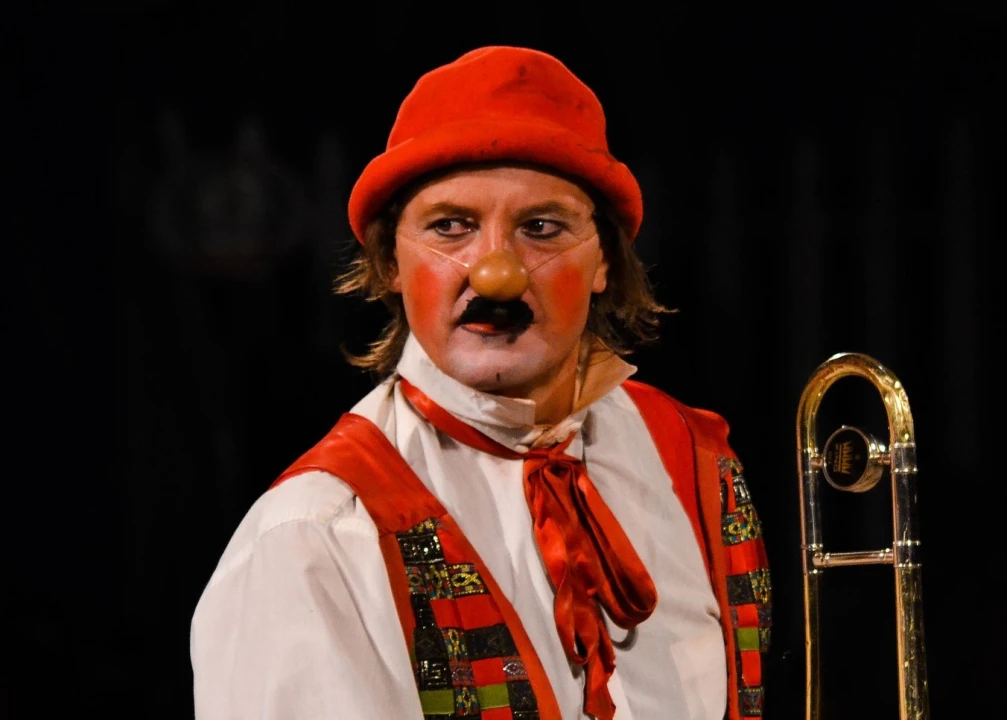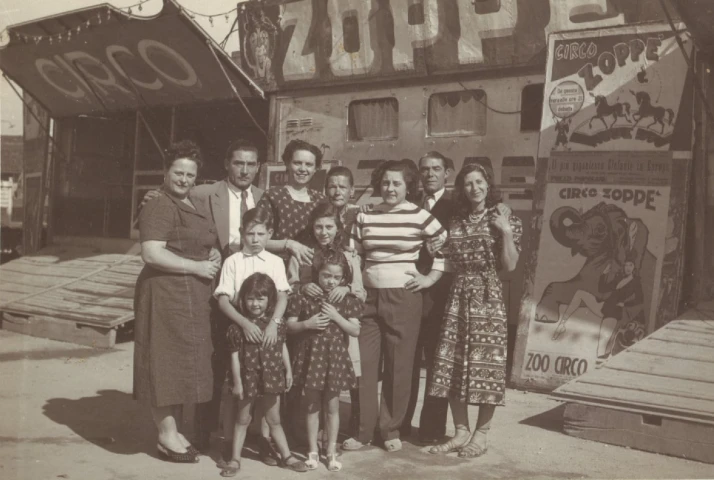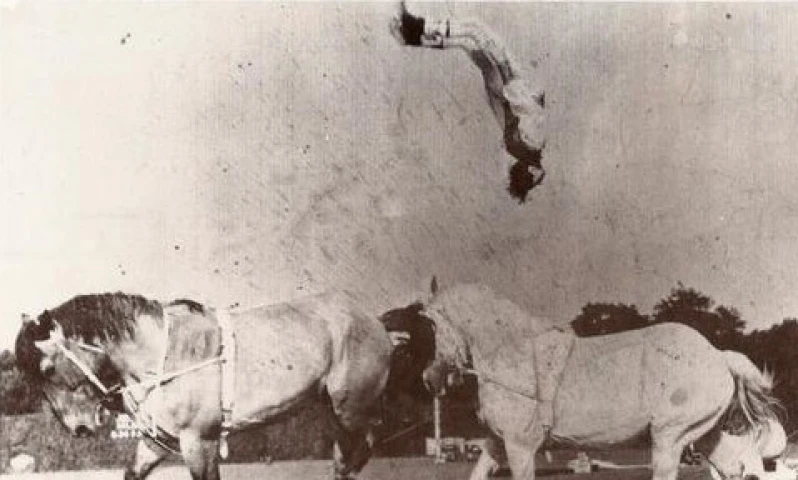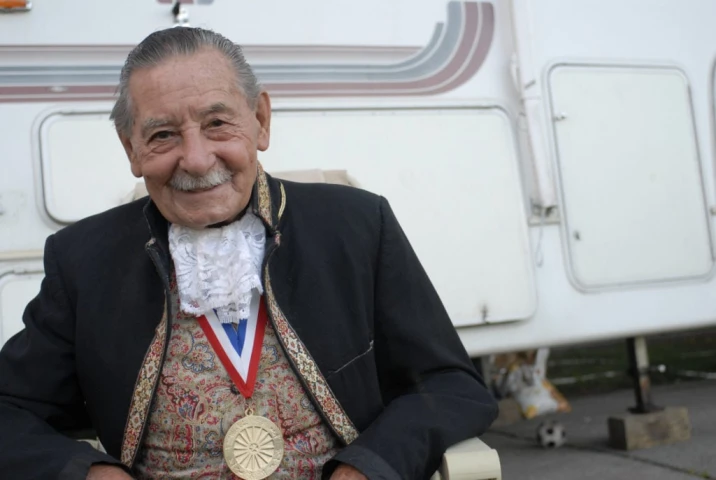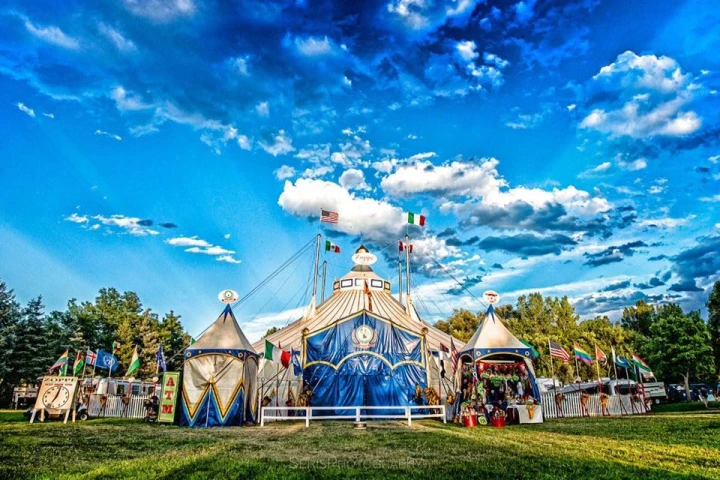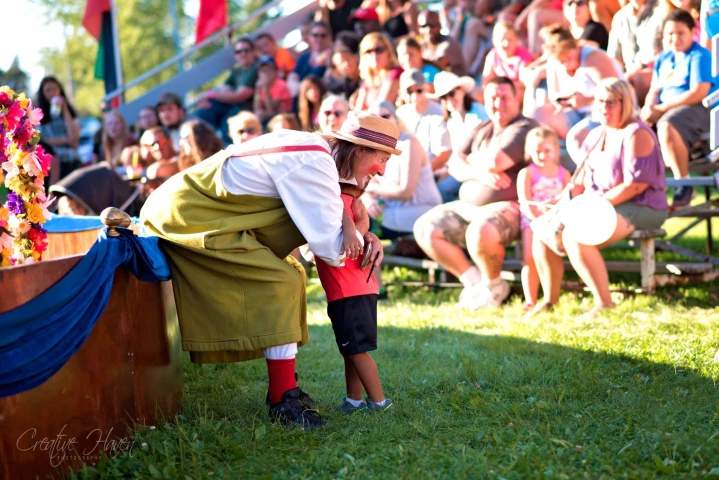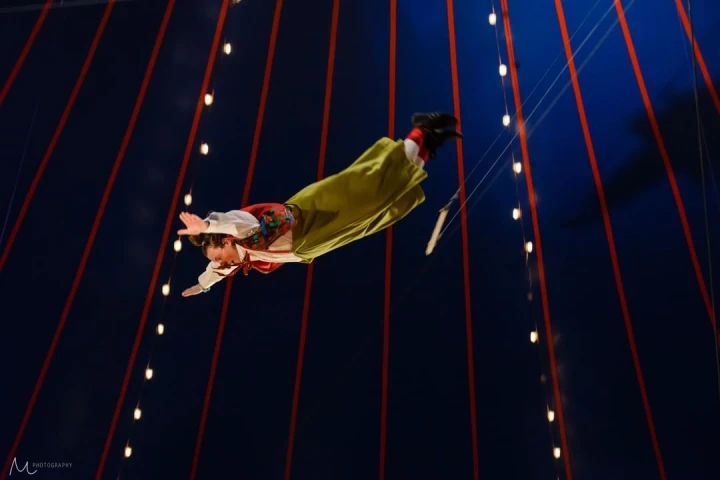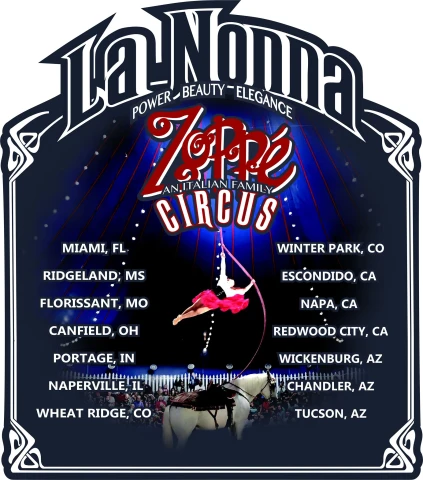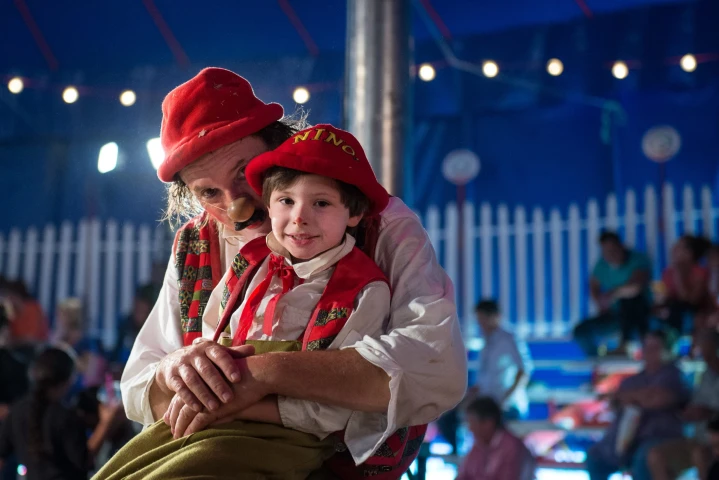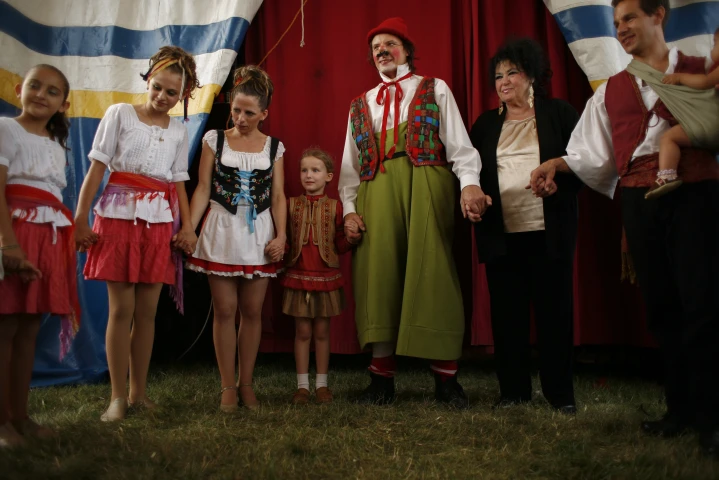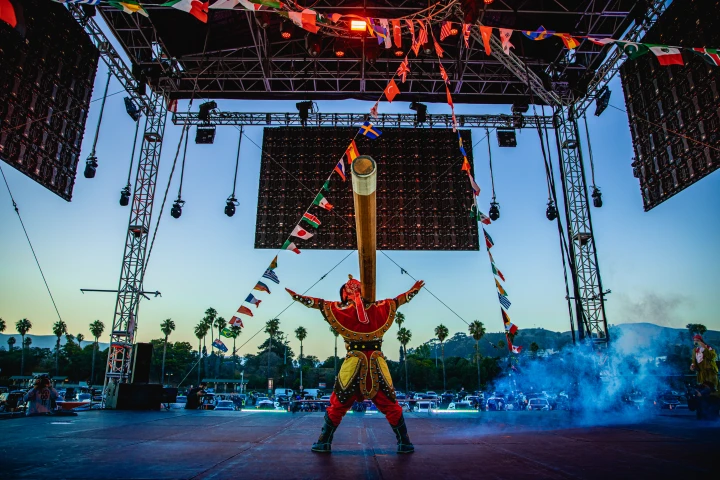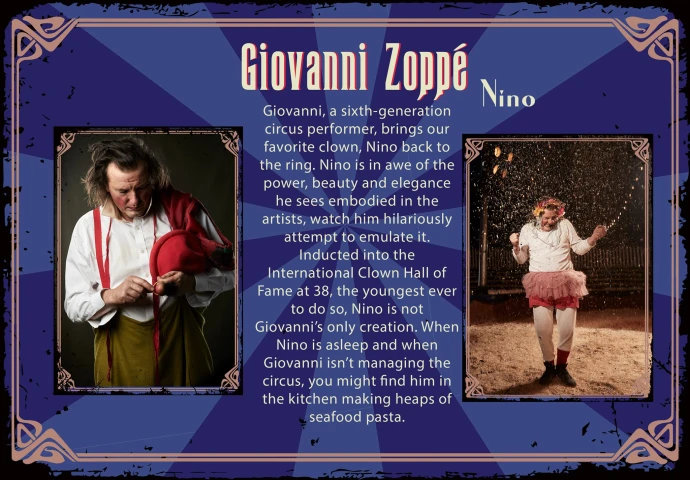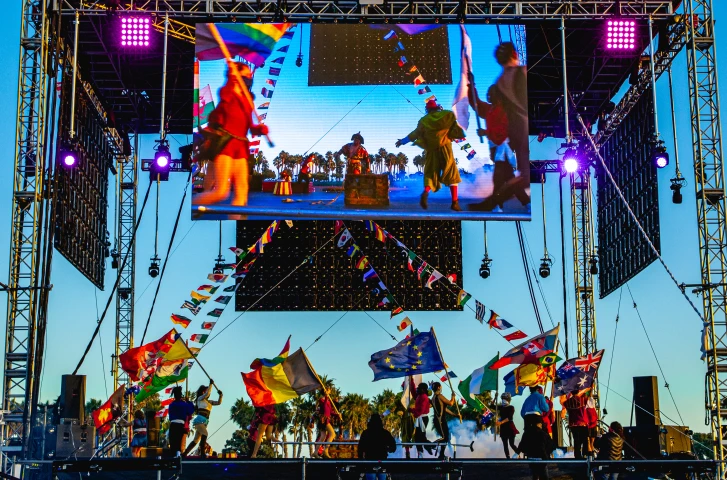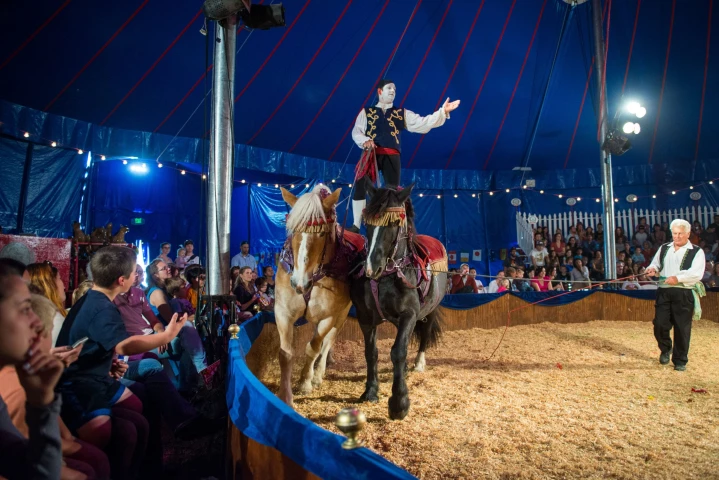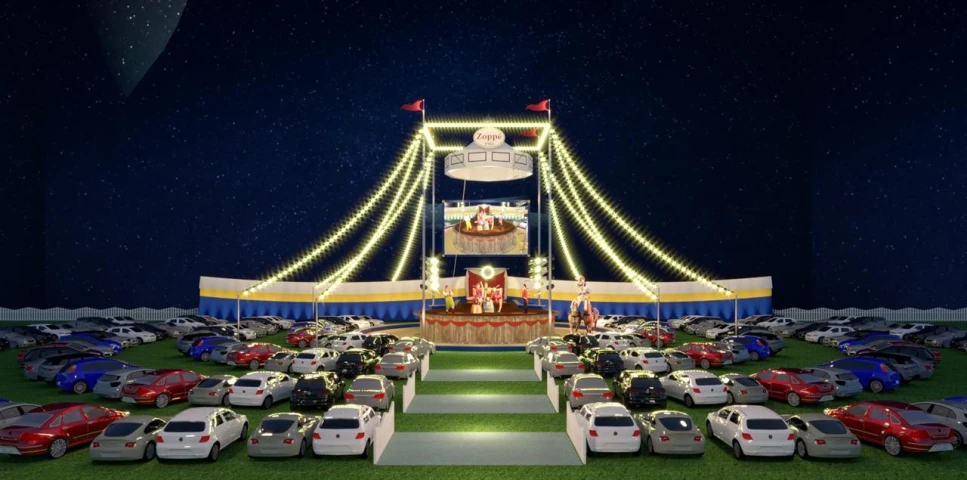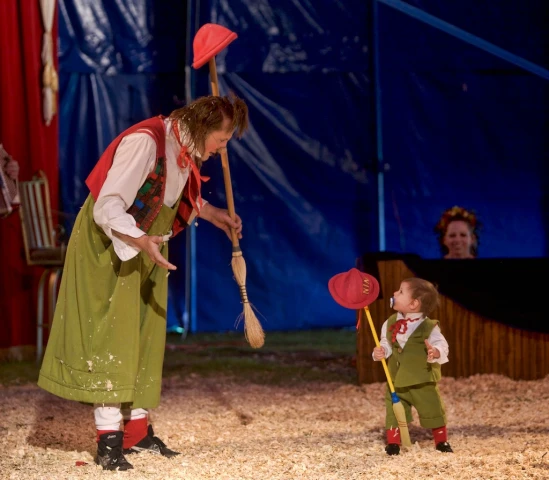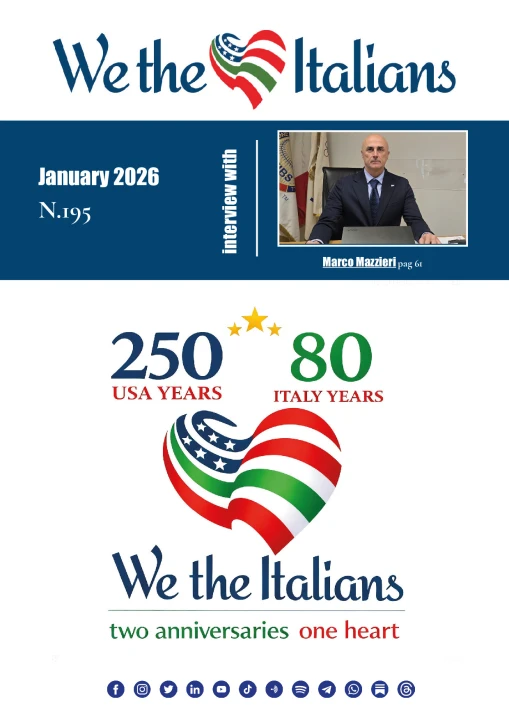Often in the past, and this year is no exception, indeed, some of those who comment on the campaign for the American elections have described it as "a circus", using this term as derogatory. In reality, a circus is a difficult and exciting undertaking, a wonderful adventure and a school of life, an inspiring show full of talent and love, family and tradition.
Talent, love, family and tradition are perfect words to describe the Italian American experience: and today We the Italians is particularly happy to host a great Italian in America, an artist and an entrepreneur, a leader who has circus in his DNA, heir of generations of Italians who first in Italy and then in America have spread joy and happiness to millions of people. It is an honor and a privilege to welcome here with us Giovanni Zoppè, director of the Zoppé Italian Family Circus.
Giovanni, the 178-years old story of the Zoppè Family Circus would be a perfect plot of a movie: you have talent and tragedy, the Spanish flu and coronavirus, war bombings and travels all over the world, Orson Welles and Fidel Castro. Can you tell us how it was born, and how it evolves to the present day?
To tell my family’s story from the real beginning would take me too long because I have proofs that my family actually started in 1720, we are seven generations, so we should go back another 300 and some years. So, I actually take into considerations 1842 as the year in which our activity started, since then my family came back together and they created the show. During the Spanish flu, my family started doing movies, probably because circus was impossible to do. When the flu ended, they went back to the circus, a stable circus, with the arena. In those days, when the circus would come to town, it wouldn’t host just our shows: the arena would be the only place to organize events in town, and so it would also host boxing, theater shows, even political events and all sorts of public activities. It was the place where people used to go.
Then there’s story about the bombing. It is a very sad story of my family when they started bombing over the city during the second world war. My father used to tell me stories about that, I think they were in the North of Italy, I do not know exactly where, and they were working for the military. Once they had to run away from the circus and jump in the foxholes to protect themselves from the bombing. When they got back to check the circus, there were just flames and smoking ashes. My grandmother was on her knees crying and screaming and asking God why this happened! The main reason of her despair was that when they run away, there was no time to take the animals out. So the monkeys, the lions, the tigers, the bears, the horses were still in the cages but all burnt in the fire. To us, as to all circus’ people, animals are our life! We live with them, they are part of our family. This was a tragedy for my family but mostly for my grandmother who raised the animals from nothing. My grandmother took a pile of ashes and she rebuilt up the circus with five children! It was my grandmother to hold the reins of the show, she was the power of it.
About Orson Welles, my family was doing a show around Rome, where Orson Welles lived, and through him, the London Films, that was doing a movie on a circus, used my family circus as the backdrop for the movie. Orson Welles and my father became very close friends and the famous director was a friend of Cecil B. DeMille who was making a new film about circus called “The greatest show on earth”. So Welles contacted DeMille telling him about my father and his circus. DeMille was negotiating with John Ringling North in order to make the Ringling Circus the background of the movie. The two contacted my father and travelled to Italy in three different occasions inviting my father to come to America. But my father always refused because in 1947-1948 the circus was booming and my father was the star of the show, he was the one who was selling tickets, the promoter, the director of the show and he could not leave his home. It took three times and the third time, my father said that he would have come. When he was taken to the airport to fly to America, they sat in a coffee shop and my father found out that the Ringling Circus had 52 elephants at the time: in Europe there were very few elephants, because of war. So, it would have been incredible for our circus to have an elephant, and then my father said that he would not go to America unless they would send an elephant to his circus. Of course, this caused an arguing between them which ended by a deal: they would send an elephant to my father’s circus only if he was able to pay the freight, and in that case he could also keep it. The cost was 250 dollars but he had American Express to make advertisement and to pay for it. So the elephant went to Europe and stayed there, while my father went to America and he stayed in America.
About Fidel Castro: my father was producing a show for Ringling in Cuba when Fidel Castro took over, and all our artists were scared. Therefore, my father said it was about time to go back to America. Castro’s military didn’t like Americans and they were awful to them. That’s why my father said to the members of the circus: “All of you behind me! And whatever they ask you, you just say: si, si, si, si, we are all Italians!” So he took the whole troop out of the parking area and they kept on going and they were stopped many, many times and questioned : “Who are you? Where are you going?” and they all always answered: “Sono Italiano! Tutti Italiani here and andiamo all’aereo. Si, si, si” and then they all got on the plane. The plane was ready to take off, the engine started, and then Cuban police stopped the plane. My father and everybody in the plane were very scared. Someone from Castro’s military came on board and looked around, and they pulled one guy, a clown, out of the plane. They took him for a couple of hours. Circus’ people were scared to death not knowing what it was going to happen. Then the door opened and the police pushed the guy back on the plane and they finally took off. They went back to Miami and as they arrived they kissed the ground.
Family is a fundamental part of the Italian life, why family life connect so well in circus? A circus is a family, am I right? Is that why you created a show called “La Nonna”?
Yeah, circus is so tight, we live together, we are part of a community. So it is more than a bound, it’s a real family. That’s the reason why I say that circus and family are the same word.
About “La Nonna”, this show started mostly because of what I said before: it was my grandmother who kept the family and the show alive. Most of the Zoppè women were and still are very strong, nowadays my sister Tosca is struggling to keep our name up and alive. That’s why I chose La Nonna; actually I was starting with “La Donna”, but then I thought that “La Nonna” was more about the Zoppè’s family. Of course it was about my Nonna, but also about the equality of everybody, it is about all of us, we are all in this together, we are in the same team and once we realize it, life is better for everybody. It is not about winning or losing the approval of someone, it is about being ourselves. So “La Nonna” started to be about equality, it is representing all women of today with the struggles they all have to go through. And also men have to struggle, but you know, women have to struggle to stay in this world.
How much is there of Italian in your show? I think your stage name is Nino, right?
Well, my father came to America in 1948, he used to go back three or four times a year, I still have family that lives up in the North of Italy. I probably have blood connections with at least ten to twelve Italian circus: so there is still a very strong connection to Italy.
I was born and raised in America, but my father taught me the traditions of Italian people, the family connections. I still don’t speak Italian fluently, but I believe I have an Italian heart.
The show is presented like an Italian show and in fact our family is stronger in Europe than in US, we welcome people from all over Europe. For us it’s like to invite the audience at dinner in our house and when the show ends we say goodbye to them. The Zoppè name is an antique circus name such as Cristiani, Zacchini, Casartelli, Togni, Orfei. I worked with the Orfei family a lot in order to understand the Italian culture of circus.
Within the Italian circus community the Zoppè’s name is really well respected because of the antique connection we have with Italian circus. To go back to what we have of Italian in our circus, there is always an Italian connection because of what we are, we have Italian feelings. This year we reached back to commedia, where the roots of all arts are. I have a great friend of mine studying in Italy at the Teatro Piccolo of Milan, and he is bringing the commedia into the multimedia drive-in circus more than ever before.
Let’s talk about this. Now you have to deal with Covid-19, and your Italian genius kicked in. What is the “multimedia drive-in circus”?
Well actually I started two or three years ago to design a drive-in circus for no real reason, just because I thought that it would have been something interesting. So, when Covid-19 started, I decided to exploit the idea I had, but there was no way for us to connect with the audience as we usually do. People in the car remained behind a car glass and it was too different from the circus we were used to, there was no connection. And I think that if there is no connection, there is no reason to do the show.
Then, I got in contact with a CBF production in California that was making some drive-in concerts and we collaborated realizing a show in which there are not just circus people acting on a stage, but there are also some LED screens that show the filming of the event. But there was still not enough connection between the public and the artists, fo4r me. So I talked to a friend of mine in NY who is a film maker and has a lot of historical films of my family together. We made a short film to mix, during our show, with live entertainment. This is how we managed to create a connection! The last show we did, I was backstage as the horse act was performing, watching the cars, the horses and the screens. I just stopped myself looking down seeing people smiling to me and I could feel the energy of the audience and the connection we had, it was an amazing feeling and I started to yell down to my circus family: “We dit it! We did it!.”
One day, we will beat Covid-19. How do you see the future of Zoppè Family Circus after that? Maybe there will be technology and innovation in the circus world?
I agree, we will beat it. The problem is that it will be really tough to bring the audience back to the circus. I’m not saying that it was not already tough, because it actually was. But the Zoppè’s future is in its past, there is nothing that I can do better than what my ancestors did. I think the only future that our family has is what it has already done. I mean, it is possible to mix circus and technologies and still make it work, but in the future, I don’t know if I really would like to have screens. Technology is fantastic, we need it, but the circus it’s something real, something emotional: it’s spiritual and I think that technologies ruin this magic. Therefore, I don’t think that the Zoppè’s family will have more technologies that we have today.
Last question. You are the director of the Zoppè Family Circus, but you also are a circus clown. The figure of the clown has something poetic and revolutionary, which refers to ancient times and at the same time communicates an approach to life that transfers an increasingly necessary lightness. What is a clown's life like? And on this too, is there something Italian that helps you to interpret such an exceptional and indispensable character?
There is an old story that explains a clown’s life pretty good. It is about a person going to his therapist and saying to him “I’m sad, I’m alone, I’m dying, I have nobody, I’m devastated”. His therapist replies to him: “You know what? There is the fantastic clown Bobo who is going to perform next week in town. Go see Bobo and all of your pain and hurt will go away!”. And then the patient looks at his therapist and says: “I’m Bobo”.
The connection to Italy actually helps me in what I do. For instance, my father used to tell me some stories about my uncle Rodolfo, who was a clown too. He used to have a pocket watch on his costume’s show and he walked in the middle of the ring started staring at the audience around him. Then he took the pocket watch out and started flipping it with his fingers up and down. People were just watching him doing practically nothing but, all of a sudden, someone in the corners started laughing and then the whole audience started laughing really hard as well. He just looked at them, put his pocket watch away, turn around and walk away. That’s a clown.
It is true that in my work I might be classified as a clown but firstly I’m a human, I’m a person, I’m the director of the circus, I am part of a big family, in art we don’t have labels, we are all the same.
Spesso in passato, e quest'anno non è un'eccezione, anzi, alcuni tra coloro che commentano la campagna elettorale per le elezioni americane l'hanno descritta come "un circo", intendendo questo termine come dispregiativo. In realtà un circo è un'impresa difficile e entusiasmante, un'avventura meravigliosa e una scuola di vita, un'entusiasmante spettacolo pieno di talento e amore, famiglia e tradizione.
Talento, amore, famiglia e tradizione sono parole perfette per descrivere l'esperienza italoamericana: e oggi We the Italians è particolarmente felice di ospitare un grande italiano in America, un artista e un imprenditore, un leader che ha nel suo dna il circo da generazioni di italiani che prima in Italia e poi in America hanno diffuso gioia e felicità a milioni di persone. E' un onore e un privilegio accogliere qui con noi Giovanni Zoppè, direttore del Zoppé Italian Family Circus.
Giovanni, la storia di 178 anni del circo della famiglia Zoppè sarebbe la trama perfetta di un film: ci sono talento e tragedia, l'influenza spagnola e il coronavirus, i bombardamenti di guerra e i viaggi in tutto il mondo, Orson Welles e Fidel Castro. Ci puoi raccontare come è nato il circo Zoppè e come si evolve fino ai giorni nostri?
Raccontare la storia della mia famiglia dal vero inizio richiederebbe troppo tempo, perché ho le prove che la mia famiglia è nata nel 1720, siamo sette generazioni, quindi dovremmo tornare indietro di altri 300 anni e oltre. Quindi, in realtà prendo in considerazione il 1842 come anno di inizio della nostra attività, da allora la mia famiglia è tornata insieme e ha iniziato a fare spettacolo. Durante l'influenza spagnola, la mia famiglia iniziò a fare film, probabilmente perché il circo era impossibile da fare. Quando l'influenza finì, tornarono al circo, un circo stabile, con l'arena. A quei tempi, quando il circo veniva in città, non ospitava solo i nostri spettacoli: l'arena era l'unico luogo in cui si organizzavano eventi in città, e quindi ospitava anche match di pugilato, spettacoli teatrali, persino eventi politici e ogni sorta di attività pubblica. Era il luogo dove la gente andava di solito.
Poi c'è la storia del bombardamento. È una storia molto triste della mia famiglia, che risale a quando iniziarono i bombardamenti durante la seconda guerra mondiale. Mio padre mi raccontava storie a riguardo, credo che si trovassero nel Nord Italia, non so esattamente dove, e che lavorassero per l'esercito. Una volta dovettero scappare dal circo e saltare nelle trincee per proteggersi dai bombardamenti. Quando tornarono per controllare il circo, trovarono solo fiamme e cenere fumante. Mia nonna era in ginocchio che piangeva e urlava e chiedeva a Dio perché fosse successo tutto questo! La ragione principale della sua disperazione era che quando scapparono, non ci fu tempo per portare fuori gli animali. Così le scimmie, i leoni, le tigri, gli orsi, i cavalli erano ancora nelle gabbie, ma tutti bruciati nel fuoco. Per noi, come per tutti i circensi, gli animali erano e sono la nostra vita! Viviamo con loro, sono parte della nostra famiglia. Fu una vera tragedia per la mia famiglia, ma soprattutto per mia nonna che aveva allevato quegli animali dal nulla. Mia nonna prese un mucchio di cenere e da lì ricostruì il circo con cinque figli. Fu lei a tenere le redini dello spettacolo, lei ne fu la vera forza.
A proposito di Orson Welles, la mia famiglia stava facendo uno spettacolo in giro per Roma, dove viveva Orson Welles, e attraverso lui, la London Films, che stava facendo un film su un circo, usò il nostro circo di famiglia come ambientamento per il film. Orson Welles e mio padre divennero molto amici e il famoso regista era amico di Cecil B. DeMille che stava girando un nuovo film sul circo chiamato "Il più grande spettacolo del mondo". Così Welles contattò DeMille raccontandogli di mio padre e del suo circo. DeMille stava negoziando con John Ringling North per fare del Ringling Circus l’ambientamento del film. I due contattarono mio padre e si recarono in Italia in tre diverse occasioni invitando mio padre a venire in America. Ma mio padre si rifiutava sempre perché nel 1947/48 il circo era in piena espansione e mio padre era la star dello spettacolo, era lui che vendeva i biglietti, il promotore, il regista dello spettacolo e non poteva lasciare la sua casa. Ci vollero tre volte e la terza volta mio padre finalmente disse che sarebbe venuto. Quando arrivarono all'aeroporto per volare in America, si sedettero in un caffè e mio padre scoprì che il Ringling Circus aveva 52 elefanti all'epoca: in Europa c'erano pochissimi elefanti, a causa della guerra. Sarebbe stato incredibile per il nostro circo avere un elefante, e allora mio padre disse che non sarebbe andato in America a meno che non avessero mandato un elefante al suo circo. Naturalmente, questo causò un litigio tra loro che si concluse con un accordo: avrebbero mandato un elefante al circo di mio padre solo se fosse stato in grado di pagare il trasporto, e in quel caso avrebbe potuto anche tenerlo. Il costo era di 250 dollari, ma mio padre aveva un accordo con American Express per fare pubblicità e furono loro a pagare. Così l'elefante andò in Europa e vi rimase, mentre mio padre andò in America e rimase in America.
A proposito di Fidel Castro: mio padre stava facendo uno spettacolo per il Ringling a Cuba quando Fidel Castro prese il potere, e tutti i nostri artisti erano spaventati. Quindi, mio padre disse che era ora di tornare in America. Ai militari di Castro non piacevano gli americani, per loro erano terribili. Per questo mio padre disse agli artisti del circo: "Voi, tutti dietro di me! E qualunque cosa vi chiedano, voi dite solo: si, si, si, si, si, siamo tutti italiani!” Così portò via tutto il gruppo dal parcheggio e loro continuarono ad andare verso l’aeroporto e furono fermati molte, molte volte e interrogati: "Chi siete? Dove andate?" e tutti rispondevano sempre: "Sono Italiano! Siamo tutti Italiani qui e andiamo all'aereo. Si, si, si" e poi salirono tutti sull'aereo. L'aereo era pronto a decollare, il motore era partito, e poi la polizia cubana lo fermò. Mio padre e tutti quelli che erano sull'aereo erano molto spaventati. Qualcuno dell'esercito di Castro salì a bordo e si guardò intorno, e tirarono fuori dall'aereo un tizio, un pagliaccio. Lo portarono via per un paio d'ore. La gente del circo era spaventata a morte, non sapendo cosa sarebbe successo. Poi la porta si aprì e la polizia spinse il tizio di nuovo sull'aereo e alla fine decollarono. Atterrarono a Miami e al loro arrivo baciarono il suolo.
La famiglia è una parte fondamentale della vita italiana: perché la vita familiare è così legata al circo? Il circo è una famiglia, giusto? È per questo che avete creato uno spettacolo chiamato "La Nonna"?
Sì, il circo è così unito, viviamo insieme, siamo parte di una comunità. Quindi è più di un vincolo, è una vera famiglia. Per questo dico che circo e famiglia sono la stessa parola.
A proposito de "La Nonna", questo spettacolo è iniziato soprattutto grazie a quello che ho detto prima: è stata mia nonna a tenere in vita la famiglia e lo spettacolo. La maggior parte delle donne Zoppè erano e sono ancora molto forti, oggi mia sorella Tosca lavora duramente per mantenere vivo il nostro nome. Per questo ho scelto “La Nonna”; all’inizio lo spettacolo si chiamava "La Donna", ma poi ho pensato che "La Nonna" descrivesse meglio la famiglia Zoppè. Certo, si trattava della mia nonna, ma anche dell'uguaglianza di tutti, di tutti noi: ci siamo dentro tutti insieme, siamo nella stessa squadra e una volta che ce ne rendiamo conto, la vita è migliore per tutti. Non si tratta di guadagnare o perdere l'approvazione di qualcuno, si tratta di essere noi stessi. Così "La Nonna" ha cominciato a parlare di uguaglianza, rappresenta tutte le donne di oggi con le lotte che tutte devono affrontare. E anche gli uomini fanno fatica, ma le donne devono lottare ancora di più per restare in questo mondo.
Quanto c'è di italiano nel vostro spettacolo? Credo che il tuo nome d'arte sia Nino, giusto?
Beh, mio padre venne qui in America nel 1948, ci tornava tre o quattro volte l'anno, ma io ho ancora una famiglia che vive nel nord Italia. Probabilmente ho legami di sangue con almeno dieci o dodici circhi italiani: quindi c'è ancora un legame molto forte con l'Italia.
Sono nato e cresciuto in America, ma mio padre mi ha insegnato le tradizioni italiane, i legami familiari. Ancora non parlo bene l'italiano, ma credo di avere un cuore italiano.
Il nostro show si presenta come uno spettacolo italiano e infatti nella nostra famiglia ci sono più artisti europei che americani, accogliamo persone da tutta Europa. Per noi è come invitare il pubblico a cena a casa nostra e quando lo spettacolo finisce lo salutiamo. Il nome Zoppè è un antico nome circense come quello di Cristiani, Zacchini, Casartelli, Togni, Orfei. Io stesso ho lavorato molto con la famiglia Orfei per capire la cultura italiana del circo.
All'interno della comunità circense italiana il nome Zoppè è molto rispettato per il legame antico che abbiamo con il circo italiano. Per tornare a quello che abbiamo di italiano nel nostro circo, c'è sempre un legame italiano per quello che siamo, abbiamo sentimenti italiani. Quest'anno siamo tornati alla commedia, dove affondano le radici di tutte le arti. Ho un mio grande amico che studia in Italia al Teatro Piccolo di Milano, e sta portando la commedia nel circo drive-in multimediale più che mai.
Parliamo di questo. Ora devi fare i conti con Covid-19, ed è intervenuto il tuo genio italiano. Cos'è il "circo drive-in multimediale"?
Beh, in realtà ho iniziato due o tre anni fa a progettare un circo drive-in senza un vero motivo, solo perché pensavo che sarebbe stato qualcosa di interessante. Così, quando è arrivato il Covid-19, ho deciso di sfruttare l'idea che avevo, ma non c'era modo per noi di entrare in contatto con il pubblico come facciamo di solito. La gente in macchina rimaneva dietro a un vetro dell'auto ed era troppo diverso dal circo a cui eravamo abituati, non c'era nessuna connessione. E penso che se non c'è connessione, non c'è motivo di fare lo spettacolo.
Poi, sono entrato in contatto con la CBF in California che stava facendo alcuni concerti drive-in e abbiamo collaborato alla realizzazione di uno spettacolo in cui non ci sono solo persone del circo che recitano su un palco, ma ci sono anche alcuni schermi a LED che mostrano le riprese dell'evento. Ma non c'era ancora abbastanza connessione tra il pubblico e gli artisti, per me. Così ho parlato con un mio amico a New York che è un regista e che ha messo insieme molti film storici della mia famiglia. Abbiamo fatto un cortometraggio per mixarli, durante il nostro spettacolo, con l'intrattenimento dal vivo. È così che siamo riusciti a creare la connessione. L'ultimo spettacolo che abbiamo fatto, ero dietro le quinte mentre si esibiva il numero dei cavalli, guardando le macchine, i cavalli e gli schermi. Mi sono fermata a guardare giù, vedendo la gente che mi sorrideva e ho potuto sentire l'energia del pubblico e la connessione che avevamo, è stata una sensazione incredibile e ho iniziato a gridare alla mia famiglia del circo: "Ce l'abbiamo fatta! Ce l'abbiamo fatta!”
Un giorno batteremo il Covid-19. Come vedi il futuro del circo della famiglia Zoppè dopo? Ci sarà spazio per tecnologia e innovazione nel mondo del circo?
Sono d'accordo, lo batteremo. Il problema è che sarà davvero difficile riportare il pubblico al circo. Non dico che non fosse già difficile prima, perché in realtà lo era. Ma il futuro del circo Zoppè è nel suo passato, non c'è niente che io possa fare meglio di quello che facevano i miei antenati. Credo che l'unico futuro che ha la nostra famiglia sia quello che ha già fatto. Voglio dire, è possibile mescolare circo e tecnologie e farle funzionare ancora, ma in futuro non so se mi piacerebbe davvero avere degli schermi. La tecnologia è fantastica, ne abbiamo bisogno, ma il circo è qualcosa di reale, qualcosa di emozionale: è spirituale e penso che le tecnologie rovinino questa magia. Quindi non credo che la famiglia Zoppè avrà più tecnologie di quante ne abbiamo oggi.
Ultima domanda. Tu sei il direttore del circo della famiglia Zoppè, ma sei anche un clown del circo. La figura del clown ha qualcosa di poetico e rivoluzionario, che rimanda a tempi antichi e allo stesso tempo comunica un approccio alla vita che trasferisce una leggerezza sempre più necessaria. Com'è la vita di un clown? E anche su questo, c'è qualcosa di italiano che ti aiuta a interpretare un personaggio così eccezionale e indispensabile?
C'è una vecchia storia che spiega piuttosto bene la vita di un clown. Parla di una persona che va dal suo terapista e gli dice: "Sono triste, sono solo, sto morendo, non ho nessuno, sono distrutto". Il suo terapista gli risponde: "Sai una cosa? C'è il fantastico clown Bobo che si esibirà la prossima settimana in città. Vai a vedere Bobo e tutto il tuo dolore andrà via!” E poi il paziente guarda il suo terapista e dice: "Sono io Bobo".
Il legame con l'Italia mi aiuta in quello che faccio. Per esempio, mio padre mi raccontava alcune storie su mio zio Rodolfo, che era anche lui un clown. Aveva un orologio da taschino nel suo spettacolo in costume e camminava in mezzo al ring e si metteva a fissare il pubblico intorno a lui. Poi prendeva l'orologio da tasca e iniziava a girarlo con le dita su e giù. La gente lo guardava mentre non faceva praticamente nulla ma, all'improvviso, qualcuno negli angoli cominciava a ridere e poi tutto il pubblico cominciava a ridere anche molto forte. Lui li guardava, metteva via l'orologio da taschino, si girava e si allontanava. Quello è un clown.
È vero che nel mio lavoro sono un clown, ma prima di tutto sono un essere umano, sono una persona, sono il direttore del circo, faccio parte di una grande famiglia: nell'arte non abbiamo etichette, siamo tutti uguali.


